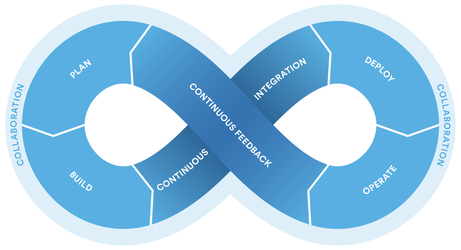 Welcome
Welcome
See also: How Atlassian Does DevOps
The DreamOps Playbook describes practices you can use in your own continuous delivery pipeline, organized around four stages: Build, Deploy, Operate, Plan.
Under Construction
Please submit feedback to the DreamOps Success Group.
(success.salesforce.com login required)
For the best bits across our Salesforce Ohana, visit www.DreamOps.org.
Deliver better software sooner using the practices defined by the DreamOps Playbook – includes coverage of Atlassian collaboration tools, Amazon Web Services, and the Force.com platform.
DreamOps content and source code is licensed under the Apache License 2.0. Linked content and images are the property of the respective copyright holders.
Developers - Use the DreamOps Playbook to improve your own software delivery practice – View the full list of practices here.
- Checklists - A resource checklist is being provided for each practices to help you implement it within your own organization (work in progress).
- Stages - Each item is organized under one of four stages (Build/Deploy/Operate/Plan) and tagged for maturity level, context, and scope.
- Maturity Level - Some practices are more difficult to implement, and so each item is also tagged by maturity level, v1 thru v4.
- Context - Each practice is tagged as to whether it applies to providing consulting services (cs), developing managed products (mp), or both.
- Platform - Roughly one-third of the practices are specific to Force.com and Salesforce, and these items are tagged as such (sf).
- Content - All practices have a title and a short description, a full description, and a resource checklist.
- Outline - To help you plan which practices to implement for your organization, we provide a Google Sheet outline that you can copy and edit.
- As the Playbook is under development, the outline also tracks our progress.
- In the outline, items with a Link to Content, have a full description and resource checklist, and are considered "done".
- Blue-shaded outline items are newly added, and not yet included in the wiki.
- In the outline, items with a Link to Content, have a full description and resource checklist, and are considered "done".
- As the Playbook is under development, the outline also tracks our progress.
The DreamOps Playbook is an open-content wiki and your contributions are welcome.
- For access, post a request to the DreamOps Success Group ("Please send me an invitation to edit the DreamOps Playbook.")
- As an editor, you may also use your personal space to implement resource checklists for your team.
- To gain access, editors must execute a /wiki/spaces/do/pages/38473788 and agree to our project management guidelines.
Next Steps
- Practice Outline - Copy this Google Sheet and select practice to implement (brace yourself).
- Practice Detail - How to implement each practice using a resource checklist.
- Provide feedback on implementing the practices, or help us include additional practices.
New! – Wondering what to do first? See DevOps: Building the Continuous Delivery Toolchain.
DreamOps Ultimate Vision
- ChatOps for All The Things - Collaborative continuous integration.
- Environments on Demand - Select, Login, and Go!
- Smart Static Analysis - Learns from human reviewers, local or global.
- Automatic Pull Requests - Everything changed and added, ready to review.
- Autowired Change Logs - Presents issues in PR with deep linking.
- Batch Size of One - Fully deployable version for each change, including help.
- Dark by Default - Enable every feature one by one, all at once, or in between.
- Deploy on Demand - Upgrade environment by group or individually.
- Status by Telemetry - Instances push vital statistics to hub for monitoring.
Recent space activity
Space contributors
- Ted Husted (1101 days ago)
Please submit feedback to the DreamOps Success Group http://dreamops.org/group.
